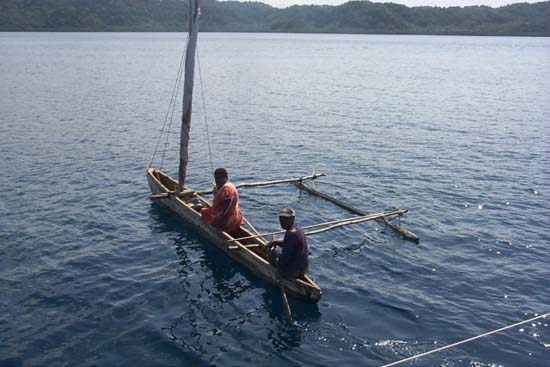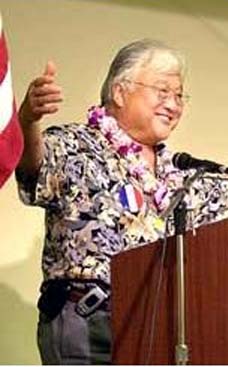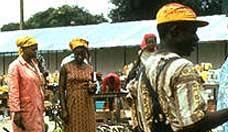
"The best part of my experience so far is tough. I don’t really know, seeing another culture, meeting the people in my group 17B, though I don’t think there will be any lasting friendships. There has not been a great sense of satisfaction in helping the people. I’m not real sure they need my help. They lead a pretty simple life, and the more they see western things the more they want useless stuff."
Tim Dobson talks about daily life serving as a Peace Corps volunteer in the island nation of Vanuatu since October 2004
Local Serving Two-Year Tenure In Peace Corps
Jennifer A. Dawicki
Special To The Dispatch
Previous Story
07/28/2005 OCEAN CITY – After serving in the local restaurant industry for the better part of three decades, Tim Dobson up and left Ocean City almost two years ago and has been in the island nation of Vanuatu since October 2004 serving as a Peace Corps volunteer.
The following is compiled from letters by Dobson reporting to The Dispatch on his experience so far.
Q. Tell us a little about yourself and why you decided to join the Peace Corps.
A. I graduated from James Madison University in 1977. I turned 50 in the village of Mongalilu on Oct. 23, 2004 in Vanuatu. I went to Ocean City in the summer of 1977 to surf and relax after the rigors of college life. I worked as a cook at Phillips Crab House on 21st Street where I met my wife Joanne. I went to work at Fager’s Island running the day kitchen in November of 1977, then went to work as a line cook at Tio Gringos in March of 1979. I started managing the kitchen in 1981 and worked with Macky Stansell until 2002 at Tio’s and Macky’s Bayside Bar and Grill.
I married Joanne on Nov. 5, 1982. Joanne passed away June 19, 2004. I left for my 27-month gig in the Peace Corps on Oct. 6, 2004.
I joined the Peace Corps because I had no idea what else to do. I needed a career change. I was tired of the restaurant business, tired of the lifestyle of Ocean City. OC had changed so much from when I had first moved there and I did not think it was for the better. In general, I was tired of the way I was living. Peace Corps is not something I ever wanted to do. I was on the JMU website one day looking at my options and noticed that a lot of JMU graduates go into the Peace Corps. I sent away for the application just to take a look.
Q. What was the application process like?
A. The application was 25 pages long and included an essay of why you wanted to become a Peace Corps Volunteer (PCV). As it turned out the week I received the application, they were doing interviews at Salisbury University. I signed up and they interviewed me. The interviewer then has to recommend you. I do not know the exact statistics, but approximately 190,000 people apply and about 7,000 volunteers are picked each year. After the recommendation you have to have to have full physical and dental work ups done. Psychological exams only if red flags come up after answering certain questions on the application. From the time of the interview, it takes about seven months to get an “invitation” to join the Peace Corps. On the invitation is your date of departure and site location. You have 10 days to accept or decline. If you decline, you would have to go through most of the process again. If you accept, you will usually be leaving in four or five months, so it takes about a year for the whole process.
After you accept the invitation, you get a package in the mail about two months before you leave. It is called your in-country package and it gives you your job, a packing list, a Peace Corps handbook and paperwork. You are a government employee so get ready for the paperwork. You also get used to waiting so now you wait some more.
Q. How did you prepare for the Peace Corps?
A. Before you go into the Peace Corps you get your stuff in order, power of attorney, sell all your stuff, put off paying student loans, say goodbye to friends, wonder why the heck you are doing what you doing, get excited, get scared … then go off and live in a hut by yourself and wonder why you are going a little crazy.
As I said, you get your job in your in country packet. I would be a trainer/teacher at a Rural Training Center (RTC). The job description was very vague and very, very general. From what it said, I could be doing anything and everything in the area I was to be assigned … you still at this point do not know what your exact location is, only Vanuatu.
I was brought into the Peace Corps to be a small business advisor because of my background in running restaurants. That ain’t what I do, but more on the later.
I prepared for the Peace Corps by quitting my job and traveling to see my friends. Looking back I’m not sure there is any way to really prepare yourself for what you are going to go through. You just go.
We got a packing list, as it turns out it is pretty generic. It actually said to bring two neckties and two pairs of long pants, both of which are a joke. Anything solar is great. I brought a solar shower, battery charger, which would be hard to live without. Also head lamps for working and reading at night. Clothes, it is hard for anyone to imagine the way we dress to do our jobs. Flip-flops are the shoe of choice and most people on site go barefoot. I wear or have worn the same four sleeveless T-shirts for the last five months. Any shorts will do – most wear board shorts and once again I rotate three or four pairs. Yes they are filthy. You cannot imagine how dirty I get, however no matter how you dress you are always dressed better than the locals.
Girls are not quite as lucky they have to wear a dress below the knee and a T-shirt, some sites are different but anywhere in Vanuatu, girls have it rougher. The women are second-rate citizens here. I would have brought another pair of flip flops, more triple antibiotic and a second solar shower, not for the warm water but I find it better than a bucket shower which is the normal shower.
I brought way too many clothes and I hardly brought any. You don’t wear underwear; you just get (uncomfortable) because of the humidity. Basically you just bring too much stuff. My guitar is probably the best thing I brought because it helps me pass time.
Q. Tell me about your journey to Vanuatu.
A. On Oct. 6, I flew to Los Angeles for what they call “staging.” Two days of training to get you prepared for Vanuatu and your Peace Corps experience … it doesn’t get you prepared but you start to bond with your training group (mine is called 17B). These are the people you will spend the next two months with and you come to know these people quite well. So far it is probably one of the best parts of the Peace Corps for me, not the staging but being part of my group 17B. We all were lucky we have a good group.
Leave LA Oct. 8 11:30 at night and take a 13-hour flight to Auckland, New Zealand. Seven hours in the airport, four-hour flight to Port Vila, the capital of Vanuatu. You cross the International Date Line so it is now Oct. 11. One week of medical training, cultural awareness, security and safety and a lot of paperwork. By now, we have acquired about 40 pounds of manuals and other assorted papers.
You are then sent to your training village where you will stay with a “host family,” who will help you learn the language and better assimilate to the culture.
Our village was called Mangalilu, about 15 miles outside of Port Vila, it was the main village where Survivor was staged.
We are then submerged in the language, eat the food, learn the culture and supposedly get technical training for your assignment. After about five weeks of training, the big day comes when you are told what site you will be going to, which means island, which in Vanuatu is a big deal because they are all different with different challenges and such. Due to the fact that it is an island nation and transportation is such a big problem, Peace Corps Volunteers (PCV) in Vanuatu are said to be a lot more isolated than in other countries, which I believe. You can go a whole two years and only see other PCV once or twice in that time.
Q. How did you end up on Maewo in Vanuatu and what is the island like?
A. So I draw Maewo, not the most isolated but out of the 19 islands, top five probably. There is a steep mountain spine that runs the length of the island. The population is about 3,000, mostly in the north where the airport is and the road. The south is more narrow and very steep.
There is one other PCV on the island, Melissa Nyguen pronounced “Win.” A 24-year-old University of Arkansas graduate, Class of 2002; she’s and hour and half walk away. She teaches math and science to 7th and 8th graders at the Gambule School, a government secondary school. I usually walk down to see her every 10 to 14 days. We talk for a couple of hours then I walk back. However there is a student of the school that lives in my village so we pass messages back and forth. She has a phone and a computer at the school so if I need to communicate with Port Villa or the outside world she will do it for me. A generator powers the computer at night between 6-9 p.m., this is when the students study so I really can’t use the computer unless it is an emergency or Melissa has time. She leaves this December and I sure hope they replace her.
Q. Tell me about your surroundings, the culture and the people where you live.
A. During training about the six week, we do what is called a “walk about.” You fly to your site for 4-6 days to check it out, see if you have any issues and generally get a little feel for the place before they drop you there for two years. On my walkabout, I found that my outhouse had no walls or roof, there was not water to my house and my house was in a 30-by-30-yard field of dirt, soon to be mud because of the oncoming rainy season.
My first impression was I got a lot of work to do, my site is a dump, but the people were real friendly and assured me the place would be ready when I returned in one month. It wasn’t although they did put walls and roof on my outhouse.
I had to end up using my own money to buy 75 yards of water pipe to get water about 30 yards from my house and I have since grown some grass, put down a coral walkway and landscaped my house.
My two-room bamboo hut sits on a little plateau about 500 yards above the Pacific Ocean in a village of five families, about 30 people, called Narea or Rockhill. There is no electricity on the island Maewo. The island is about 50 miles long and two miles wide. Ninety percent of the population is on the west coast, which is the leeward side of the island. There is one dirt road running about two thirds of the way down the west coast with little villages here and there.
The island depends on coconuts for food, fuel and money. The only way to really make money on the island is through copra, the coconut. The inside of the coconut is taken out and dried and then shipped to Santo, the largest island of Vanuatu where there is a copra factory. The oil is pressed from the coconut and used for soap, perfume, cooking oil, candles and hopefully fuel in the future. It is hard work to crack the coconut, scrape out the pulp, dry it, bag it, and get it to the dock. For this, the workers get about 100 Vatu an hour, less than one US dollar.
Most families just live off their family gardens. They eat mostly water taro, a root crop grown in terraced water plots, similar to rice fields. They eat other root crops, mawtioc, yams, cumala, few vegetables but a lot of fruit, papaya, bananas, pineapples, oranges, mangos and of course coconuts. All cooking is done over wood fires in separate cookhouses next to their living houses.
The women are the work force of Vanuatu. They cook, work the gardens, watch the pickiniwies (children) do laundry and do copra.
One of the main crops is “Kava,” another root crop. The roots are chopped, ground very fine, mixed with water and drank. It tastes like mud. It was first used at ceremonies, weddings and funerals. Now it is drank all the time, however it is still not cool for women to drink it. It gives you a buzz, a definite down. I don’t particularly care for it and probably drink it about once a month. It is a big social thing with all the men hanging around the Nakamal, which is the community-gathering place. Natives call the gathering “storing on.” Americans call it shooting the breeze and drinking kava.
Q. What is a typical day/week like?
A. My day starts at 6:30 a.m. I get up, drink coffee look at my lessons for that day, put out my solar panel, soak my laundry, rake my yard, clean around the house. It’s best to do work early when it is only 90 degrees and 90 percent humidity. By 10 a.m., it will be high 90’s and 100 percent humidity. Plus it will probably rain on and off from 10 to whenever.
School starts at 8 a.m. I teach English and small business Monday through Thursday. Friday morning I teach environment. The other teacher, John Browning, teaches carpentry and agriculture. The classes are in the morning, then after lunch we work in the garden and the shrimp farm. We are raising fresh water shrimp.
Or we do maintenance around the school. We have two acres of land that has to be cut and it is all done with bush knives by hand. We cut grass with a two-foot long knife. I am getting pretty good with my bush knife.
On Friday after environment, we work on a building, either school or in the village. It is called a practical day for carpentry class. The kids,, 13 students, 11 boys and 2 girls, go home around 3 p.m.
In Vanuatu about 80 percent of the kids only go to 6th grade, then they have to pass a test and start to pay for education, so the Rural Training Center (where I work) is like a vocational school. We collect school fees, ours is 10,000 Vatu a year or about $90 US dollars.
There are about 37 RTC’s in Vanuatu. Peace Corps Volunteers are assigned to RTC’s each and also advise on management aspects, which is very weak in Vanuatu. Most of the teachers and managers only have a 6th grade education so they hardly know how to run a school, so we help.
Q. How often do you get mail?
A. We supposedly get mail every Friday from Peace Corps headquarters. It comes on the commercial plane. That is if the plane can land. It rained so much in April only one plane landed all month. All we have is a little grass airstrip. Mail is hit or miss but it is so sweet when you get mail.
Q. Do you get to travel?
A. I go to Port Vila or Santo the other large island. It is actually called Espiritu Santo where the town of Luganville is located. In World War II 500,000 US troops went through Luganville on their way to war. I go to either city about once every two months for sanity reasons, a hot shower, English speaking people, just to get away, re-supply food, etc. I will not go back to Port Vila until December, but probably back to Santo in August.
Whenever anyone goes to Vila, it is usually to use Peace Corps headquarters somehow, either medical, which we have a very professional staff, or to use the research center which is not too bad. Or to use the computers which are what most people do to either email or to write grants which we do a lot of. There is a lot of donor money out there in Vanuatu and we try to get some for our schools.
A. What has been the best part of your experience?
A. The best part of my experience so far is tough. I don’t really know, seeing another culture, meeting the people in my group 17B, though I don’t think there will be any lasting friendships. There has not been a great sense of satisfaction in helping the people. I’m not real sure they need my help. They lead a pretty simple life, and the more they see western things the more they want useless stuff.
Q. The worst?
A. The worst part is easy. Being lonely, missing friends, missing two of my best friends’ wedding, maybe giving up a chance of a family and loving relationship. I guess wondering if two years of my life is worth it over here. It’s hard. One day you feel like really great. Great adventure, really part of something cool, “The Peace Corps.” And sometimes you feel like what the heck am I doing, I just want to go home and hit a golf ball, hug somebody, talk, well actually have a conversation. I don’t know. It is hard.
Most of the people here have never been off Maewo. They know nothing of the outside world. They know nothing of the United States. They do not know the earth spins. They want to know where the sun goes when it sets. They believe in black magic. They think if you burn certain leaves it can stop lightning. They think everybody in the United States knows everybody else. They can’t imagine the size or the climate, they have no experience to compare it to.
They now have my “Newsweek’s”, which Peace Corpss sends us, to give them a point of reference. They think all the ads are real and look at those pictures the most.
I miss the people most. The food is fine. I don’t miss electricity, going to the bathroom in a hole is okay, cold water is okay, all the bugs, rats, the rain, the heat and boredom, all of these things you adapt to. A lot of times I feel like there is something more important I could be doing. It’s peaceful here, beautiful, the people are friendly. It’s made me think about life a lot.
I like the United States. I like my family and friends. About 90 percent of the young kids in Vanuatu are running from bad families and relationships. They talk about the states and say it is too crazy and too commercial and while I agree, I tell them we have choices to do what we want.
I miss choices. People in Vanuatu live simple, yet boring lives. They don’t have choices. They get up, they survive the day. They go to bed and they are happy because they don’t know any better. I guess that’s okay. I know better.
Q. Will you be able to come home over your two and half year assignment and will you move back to Ocean City?
A. I will be coming hone Nov. 29 for Christmas until Jan. 15 I think. I will always visit Ocean City. I have learned never say never, but I do not want to live in Ocean City again. Been there done that. I miss the mountains. I think that is where I want to live.
All material copyright 2005 The Maryland Coast Dispatch, Berlin, MD.











